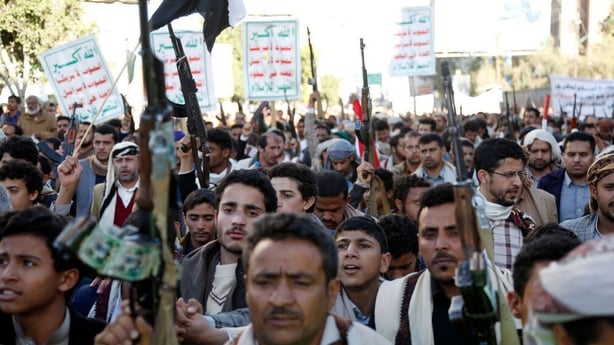The UN's top official for Yemen has said leaders should not waste the chance for peace.
In a briefing to the Security Council yesterday, Special Envoy Hans Grundberg said the security situation on the ground remained relatively stable and called on all parties to take advantage of the current lull in hostilities to take steps to end the war.
"Yemen needs an agreement that includes a shared vision for the way forward, in order to avoid a return to full-blown conflict, he said.
"I therefore urge the parties to make the most of the space for dialogue provided by the absence of large-scale fighting," he told ambassadors in New York.
Referring to international and regional efforts to facilitate mediation, including the most recent visit of a delegation from Oman, Mr Grundberg said: "We are witnessing a potential step change in the trajectory of this eight-year conflict.
The ongoing dialogues are a possibility that should not be wasted," he added.
The war in Yemen began in 2014 when Iran-backed Houthi rebels toppled the internationally-recognised government and took control of the capital, Sana'a.
In March 2015, a Saudi-led military coalition intervened in support of government loyalists, launching airstrikes and implementing a naval blockade.
Often described as "the forgotten war," the conflict in Yemen has killed, directly or indirectly, more than 377,000 people, according to the United Nations.
More than 11,000 children have been killed or maimed since fighting began.
4.3 million people have been displaced – the vast majority are women and children.

Britain and the United States have been criticised for selling arms to Saudi Arabia and the United Arabs Emirates that are used in Yemen.
A new report published last week by Oxfam, estimated that between January 2021 and February 2022, at least 87 civilians were killed by airstrikes carried out by the Saudi-led coalition in Yemen using weapons supplied by the UK and US.
"The sheer number of attacks on civilians is stark testament to the terrible tragedy the people of Yemen have suffered," said Martin Butcher, Oxfam's Policy Adviser on Arms and Conflict and author of the report.
"Our analysis shows there is a pattern of violence against civilians, and all sides in this conflict have not done enough to protect civilian life, which they are obligated to do under International Humanitarian Law," he said.
"The intensity of these attacks would not have been possible without a ready supply of arms. That is why it’s vital the UK government and others must immediately stop the arms sales that are fuelling war in Yemen," he said.
The report comes ahead of a High Court challenge at the end of this month, brought by the Campaign Against Arms Trade (CAAT), which accuses the UK government of acting unlawfully.
Meanwhile, human rights groups have catalogued atrocities carried out by Houthi militia groups since fighting began, including the kidnapping of civilians, torture and recruitment of child soldiers.
Last week, new evidence of arms smuggling from Iran to the Houthi rebels emerged. The US Navy reported it had intercepted more shipments of weapons, thought to be made in Russia and China, en route to Yemen. Iran has denied arming the Houthis.
In the areas of Yemen under Houthi control, the UN Undersecretary for Humanitarian Affairs and Emergency Relief Coordinator, Martin Griffiths, in his briefing to the Security Council yesterday, said aid operations were being severely restricted by the imposition of "mahram" (male guardian) requirements.
"They curb the work of our staff, and they limit the social and economic participation of female humanitarians.
They impede effective programme delivery by forcing delays or even suspensions of critical missions and programmes," he said, "and they are increasingly severing our access to Yemen’s most vulnerable people, especially women and girls, who are already so disproportionately affected by the crisis."
"2023 will be another extremely difficult year for Yemenis," he said.
"Humanitarian needs remain alarmingly high, as the country’s economy continues to weaken and basic services hang by an ever-thinning thread," he said.
Echoing the words of the Special Envoy, he added: "This year brings a genuine opportunity to move the political process forward.
"The international community – and more importantly the parties to the conflict – must not let this chance go to waste."







